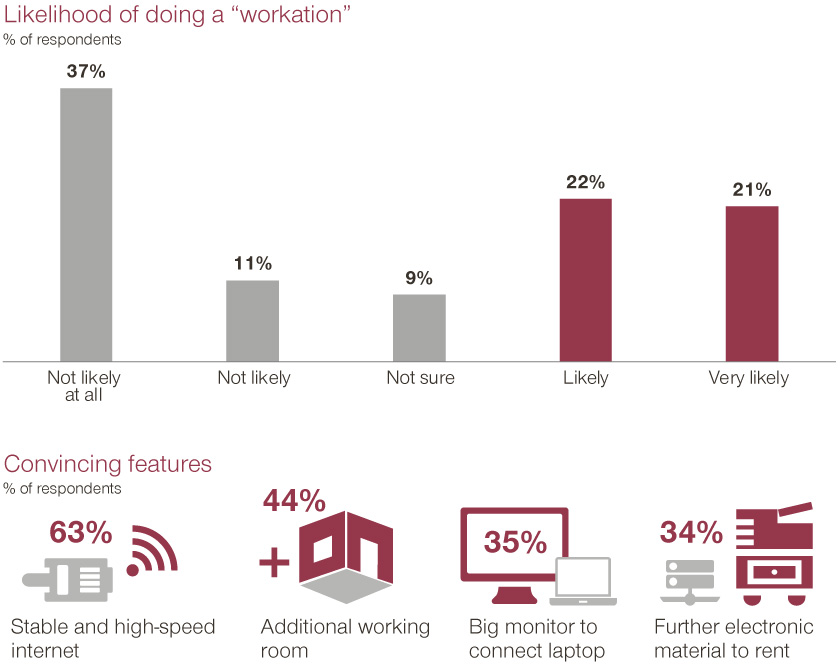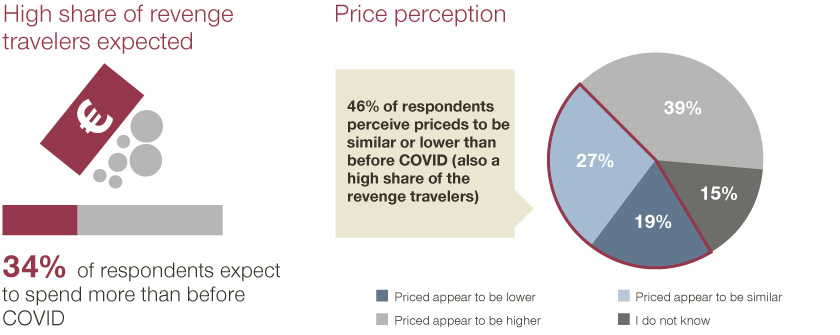Has the summer been saved? As leisure travelers enthusiastically move ahead with their vacation plans, we look at how the pandemic has changed customer needs and preferences, and will continue to influence travel plans throughout 2021. Read the results of our global Travel Trends 2021 study here!
The Revenge Traveler is here to stay – our global Travel Trends 2021 study shows that 45 percent of consumers want to travel more than prior to the pandemic. And that’s not the only good news for the industry. Those who are planning a break for this summer and the years ahead are also willing to spend more in the on holidays!
The travel revival is already unfolding and evident in our study results: 30 percent of those surveyed have already booked their summer 2021 getaway. Other leisure travelers are still planning to book a vacation for this summer and beyond, with 32 percent intending to book more at short notice.
So what makes the revenge traveler tick? And what will this pent-up travel demand look like in reality? Based on the results of our study, we identified three key trends that will impact the travel industry in the months and years ahead:
- Staycations and domestic travel are here to stay
- “Workations” gain popularity thanks to remote working
- Revenge travelers are revenge spenders!
How do these trends compare to our previous study? Read our December 2020 results here!
Three key travel trends
- Staycations and domestic travel are here to stay
Pandemic-related restrictions continue to play a role in holiday decision-making. With many countries still experiencing varying degrees of lockdowns and restrictions, travelers want assurance that they can go on holiday with minimal limitations or risk of having to quarantine. Here, customer behavior is influenced by three pandemic-related factors: restrictions in place at the desired travel destinations, governmental restrictions, and trust in the health system of the destination. Due to the ongoing uncertainty connected to traveling abroad, there is a growing tendency for consumers to holiday within their own country instead, and to choose more socially distanced accommodation and ways of travelling. Overall, our study shows that 41 expect to travel with their private car and 32 percent of consumers prefer to stay within a rental or holiday apartment.![travel]()
- “Workations” gain popularity thanks to remote working
For many travelers, workations – combining holidays with remote work – have never been more feasible. Nearly half of the respondents in our survey (43 percent) said that they anticipate taking a “workation” in the near future, thanks to the increased flexibility of hybrid working models. The most enthusiastic response came from China, where 70 percent said they are likely to do a workation in the future. This opens up opportunities for players in the tourism industry as 76 percent of those who plan to take a workation say that, the ability to split their time between working from their destination and enjoying time off and/or with their families and friends, will allow them to extend their trip by a week or more. But there are key enablers to convince travelers to go for this experience: the most important features in selecting a workation destination being a stable and high-speed internet/Wi-Fi connection and a dedicated working space.![travel]()
- Revenge travelers are revenge spenders!
The average travel consumer has a significantly elevated budget to spend on travel, which isn’t expected to change anytime soon. Our survey shows that 34 percent of international respondents expect to spend more on leisure travel beyond this summer as compared to pre-pandemic, with the largest share of higher future budget observed in Russia (52 percent) and the lowest in Germany (27 percent). This is unrelated to perceived higher prices - respondents largely do not perceive prices related to travel to be higher than pre-pandemic – and while price remains a main decision driver, this indicates some headroom for travel companies.![travel]()
So how should players in the travel and tourism industry respond to the trends and opportunities ahead?
- Maintain the old, embrace the new: COVID-19 has shaken up travel and booking habits. New and lasting changes in behavior should therefore be reflected in your offer design, sales, and communication approach, but also your revenue management strategies.
- Facilitate and promote staycations and workations: Don’t neglect your local source market – this key segment will have different needs and expectations surrounding their vacation. Meanwhile, the shift to remote working and hybrid models calls for setups which allow workation-travelers to be effective during the day and relax in a lovely holiday spot during the evening and weekends. Setting up infrastructures to meet these needs is a first step in the right direction.
- Push up- and cross-selling: Our study also shows that an important share of customers expect their travel budget to stay stable or even increase in the next years. Think about what additional products and services you can offer customers to tap into this higher readiness to spend.
- And of course, support your customers: Demonstrate flexibility in your booking conditions and show that you have taken all precautions to ensure a safe and enjoyable stay for your guests.
Or reach out to Lisa Remmelberger, Dimitris Hiotis, and Dario Sangiovanni for the full study results and to start an individual discussion today!










